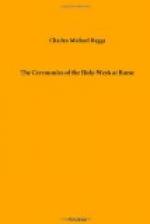[Footnote 40: Anciently a cardinal deacon used to read it, and to sing only the words “Eli, Eli, lamma sabachthani".]
[Footnote 41: The author of this exquisite chant is unknown: Baini supposes that he was a member of the pontifical choir: it has been sung in the papal chapel since the middle of the 13th century. In 1585 it, together with the rest of the service of holy week, was published by Tommaso da Vittoria with the words of the people harmonised for 4 and 5 voices; his method was adopted by the papal choir, which adorns it with many traditional graces, and in particular gives occasionally, says Baini, to the words of the multitude “the irresistible force of a most robust harmony”. The abbate Alfieri has published a new edition of the Passios.]
[Footnote 42: In Africa till the time of S. Augustine, the Passion used to be read in holy week from the gospel of S. Matthew alone; but by his direction, as he mentions in his 232nd discourse, it was read every year from all the four evangelists; and this custom is still observed.]
[Footnote 43: That God, after He has pardoned sin and consequently remitted its eternal punishment, often, if not generally, demands temporal satisfaction from the sinner, is evident from many instances in scripture, such as those of David (2 Sam. XII) of Moses (Deuteron. XXXII compare Num. XIV) to say nothing of Adam (Gen. III) and all his posterity, who endure the temporal punishment of original sin, even when its stain has been washed away by baptism. Now the church by virtue of the ample authority with which Christ has invested her (Matt. XVIII, John XX) and in particular her chief pastor (Matt. XVI) has from the beginning exercised the power of remitting the temporal punishment of actual sins. Thus S. Paul pardoned the incestuous Corinthian (2. Cor. II): in times of persecution the bishops at the request of the martyrs remitted the penance imposed on those who had fallen into idolatry (Tersul. lib. ad martyres, Euseb. Hist. Eccl. lib. V, c. 4. S. Cyprian. Epist. XIII etc.), to say nothing of canons of the 4th century which prescribe that indulgences should be granted to fervent penitents, of the crusades, and of the indulgences granted to those who contributed money for the building of S. Peter’s, etc. Indulgences presuppose repentance and confession, and the performance of those good works which are prescribed as conditions necessary for their acquisition, as communion, prayers, alms etc.]
[Footnote 44: It was built by Calixtus II, and was for two centuries and a half the Vestry of the Roman Pontiffs. It was repaired and consecrated in 1747. See Cancellieri. De Secretariis T. I, p. 342.]




